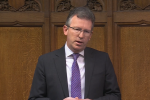The imposition on the Prime Minister of a fixed penalty notice for breach of COVID-19 regulations is dramatic and unprecedented. It undoubtedly weakens the Prime Minister’s own authority and that of his Government and, for some, it constitutes sufficient cause for his removal from office. I have thought carefully about whether it should lead me to reach the same conclusion at this stage. The first question to be asked is whether any and every breach of law should disqualify a Prime Minister from office, given that they lead Governments whose role is to persuade Parliament to pass those laws. As a matter of fact, our constitutional rules do not require a Prime Minister who breaks any law to leave office and I do not think it would be right to require this in all circumstances.
The circumstances of this breach should therefore be considered. The gathering that constituted it was, by all accounts, a surprise to the Prime Minister, as it was designed to be when he was presented with a birthday cake, and was over quickly. That does not make it permissible of course and the Prime Minister has accepted without argument the judgment of the police that it was outside the rules in place at the time, rules which, as I have observed before, many were taking pains to keep to, often at great cost. It is however relevant mitigation. I can understand why many will not wish to do so, but I can also see how a single mistake can be forgiven, even when it is made by a Prime Minister.
What is not forgivable is either a pattern of behaviour or dishonesty. On the first of these, I repeat the importance of Sue Gray’s investigation, which she was asked to conduct into the nature and circumstances of each of the Downing Street events in question. There is nobody in a better position to judge whether there was a pattern of behaviour here, on the part of the Prime Minister or anyone else, and I continue to believe her report will be very important evidence for those of us reaching conclusions on the Prime Minister’s future. We do not of course yet have that report. On the question of dishonesty, I have said before that misleading the House of Commons is particularly serious and if the Prime Minister has done so he should go. The House of Commons Privileges Committee will now investigate that question in relation to the series of events and statements relating to them, but it does not seem to me proven that the Prime Minister misled Parliament about the event for which he has received a fixed penalty notice. Misleading the House of Commons consists of telling it something that you know to be false or do not believe to be true, not telling it something you believe to be true but which is later found not to be the case. It is in my view conceivable that the Prime Minister has believed consistently that the event in question was not a breach of the rules, though he now accepts that it was. It is also my view however that the overall picture of Downing Street events which the Prime Minister attended, or of which he was aware, may make that allegation of misleading Parliament (by saying that, as far as he was aware, all the relevant rules were followed there) impossible to defend. Again, Sue Gray’s report, based on the evidence she has seen and heard and which the rest of us have not, is crucial in making that judgment.
I can appreciate that many will find these explanations frustrating and legalistic, and want quicker conclusions. I appreciate too that some of my colleagues have already reached theirs, but I cannot avoid approaching this question with a legal background and I think it has to be done rigorously. I believe that due process and the proper consideration of all the evidence are important for everyone. When it comes to removing an elected Prime Minister from office, they must be especially important, and even more so when the accusations against him include that he does not follow proper process himself. Those who judge him must be especially careful to ensure that they do.

